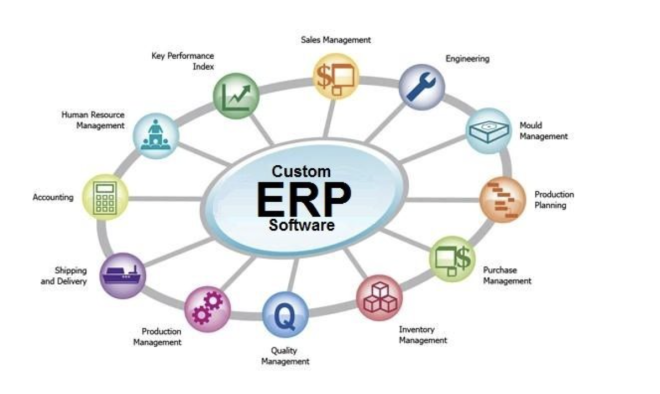- Change theme
How Custom ERP Solutions Drive Sustainable Business Growth

Today's dynamic business landscape requires robust systems capable of streamlining processes.
10:05 29 April 2025
Today's dynamic business landscape requires robust systems capable of streamlining processes, enhancing efficiency, and delivering precise, data-driven insights. Organizations increasingly turn to custom ERP software, recognizing the value of ERP customization in aligning their technological capabilities closely with strategic goals. Customized ERP solutions are no longer a luxury but an essential competitive advantage.
What Is a Custom ERP Solution?
A custom ERP solution refers to enterprise resource planning software specifically tailored to the unique operational and strategic requirements of a business. Unlike standard off-the-shelf ERP systems, custom ERP software is designed from scratch, ensuring seamless integration with existing business processes and systems.
The development of a custom ERP system typically involves collaborating with a specialized custom ERP development company. This partnership ensures deep alignment between the ERP solution and the distinctive aspects of your operations, enhancing performance and delivering superior outcomes.
Key Benefits of Investing in Custom ERP Development
Tailored Functionality
Generic ERP solutions often include unnecessary modules and miss crucial functionalities, leading to operational inefficiencies. Custom ERP software addresses these gaps, providing functionality specifically relevant to your business, thereby streamlining operations and reducing resource waste.
Enhanced Operational Efficiency
One of the significant advantages of customized ERP solutions is their ability to automate repetitive tasks, significantly reducing manual labor and the potential for human error. Such automation not only increases productivity but also frees staff to focus on higher-value strategic initiatives.
Improved Data Accuracy and Accessibility
Custom ERP development ensures centralized data management, reducing discrepancies and enhancing the accuracy of business insights. Tailored reporting and analytics capabilities enable quick, informed decision-making, enhancing business agility.
Scalability and Flexibility
Scalability is a critical consideration for growth-oriented businesses. Customized ERP solutions are built with future growth in mind, easily accommodating increased data volumes, new processes, and expanded user bases, all without disrupting existing operations.
Essential Components in Custom ERP Development
Finance and Accounting Integration
Finance modules within custom ERP systems handle tasks such as invoicing, budgeting, tax compliance, and financial reporting, ensuring accurate financial management and transparency.
Human Resource Management
A customized ERP solution efficiently manages HR activities, including recruitment, onboarding, payroll processing, and performance evaluation, significantly improving administrative efficiency and workforce management.
Inventory and Supply Chain Optimization
Customized ERP solutions enhance visibility across inventory and supply chains. ERP customization in logistics helps streamline procurement, stock management, and distribution processes, minimizing delays and reducing operational costs.
Customer Relationship Management (CRM)
Integrating CRM functionalities into your ERP system allows businesses to deliver personalized customer experiences, enhancing client satisfaction, retention, and ultimately revenue growth.
Selecting the Right Custom ERP Development Company
Choosing the right ERP software development partner is crucial. Here’s what to look for in an ideal provider:
- Industry Expertise: The company should demonstrate proven experience within your sector or related industries.
- Comprehensive Technical Skills: Look for proficiency in contemporary technologies and agile methodologies.
- Transparent Communication: Open and frequent dialogue ensures alignment between your expectations and the delivered ERP solution.
- Post-Implementation Support: Robust support is essential for continuous system enhancement, maintenance, and troubleshooting.
Custom ERP Development Process: Step-by-Step
Step 1: Business Analysis and Requirements Gathering
An in-depth assessment of your existing processes and strategic goals ensures clarity and precision in defining ERP requirements.
Step 2: ERP Solution Architecture Design
A well-defined solution architecture ensures the ERP system will support your processes seamlessly, offering clear data pathways and user-friendly interfaces.
Step 3: Development and ERP Customization
Skilled developers and engineers build the ERP solution tailored precisely to your outlined specifications, integrating modules and features required by your operations.
Step 4: Comprehensive Testing
Thorough testing of your custom ERP system ensures reliability, security, and high performance, safeguarding against operational disruptions upon implementation.
Step 5: Implementation and Training
Proper implementation, coupled with targeted training sessions, ensures seamless adoption by your team, maximizing the ERP system's effectiveness.
Step 6: Continuous Improvement and Support
Ongoing support facilitates regular updates and adaptations, ensuring your ERP system evolves in line with your business needs.
Real-World Advantages of Customized ERP Solutions
Businesses across sectors benefit from custom ERP solutions. Here are tangible examples of such impacts:
- Cost Reduction: Customized ERP systems cut costs by reducing operational redundancies and automating processes.
- Enhanced Collaboration: Improved interdepartmental collaboration occurs through unified systems, streamlining communication and reducing silos.
- Greater Competitive Advantage: Organizations leveraging tailored ERP systems can rapidly adapt to market changes, maintain compliance, and respond to customer demands faster and more effectively than competitors.
Future Trends in ERP Customization
As technology evolves, ERP customization is expected to integrate advanced capabilities such as artificial intelligence (AI), machine learning (ML), and Internet of Things (IoT) devices, further increasing efficiency, predictive capabilities, and real-time responsiveness. Businesses investing now in custom ERP software will remain at the forefront of these developments.
Conclusion
Custom ERP development represents a strategic investment that enables businesses to harness operational efficiency, scalable growth, and strategic agility. The unique capabilities provided by custom ERP systems significantly outweigh those offered by generic ERP solutions, setting the stage for sustained success and competitive dominance.
When executed effectively, ERP customization positions businesses to respond dynamically to challenges and opportunities, fundamentally enhancing their long-term market positioning and profitability. Choosing the right custom ERP development services provider is, therefore, not merely an IT decision but a pivotal strategic choice that shapes the future trajectory of your enterprise.
